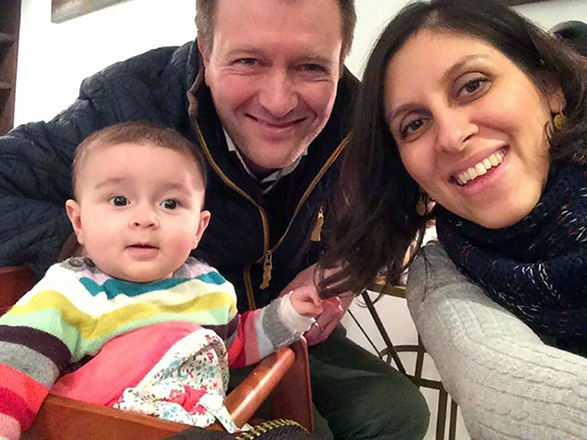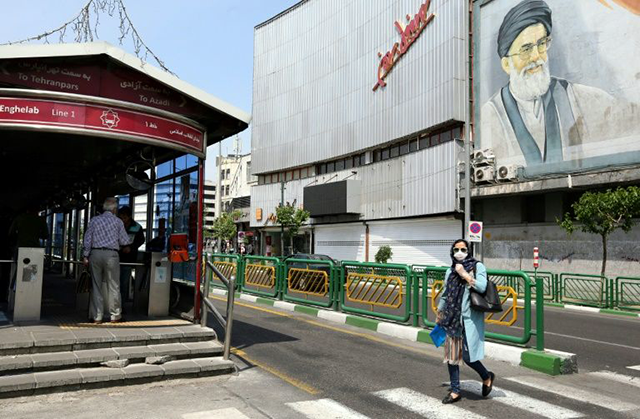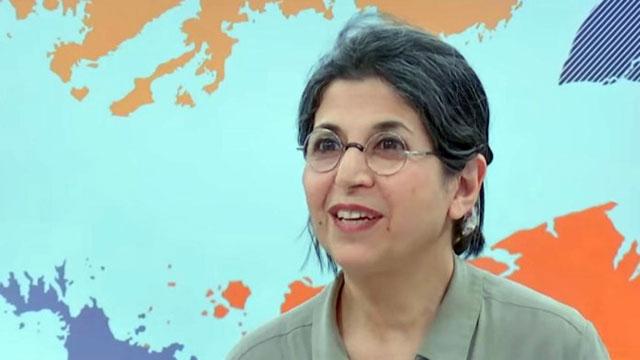You are here
Iran prisoners 'on edge' over virus threat
By AFP - Apr 22,2020 - Last updated at Apr 22,2020

Nazanin Zaghari-Ratcliffe, pictured with her husband Richard and daughter Gabriella in 2016, has been given a temporary furlough from prison (AFP photo)
PARIS — The crippling uncertainty behind bars as a deadly disease rages. A lack of proper sanitary equipment. Riots by desperate detainees that allegedly have left dozens dead. And executions that proceed in spite of the outbreak.
There is controversy over the magnitude of the coronavirus outbreak in Iran, which according to official figures has left almost 5,300 people dead although other sources, inside and outside Iran, insist the real figure is twice as high.
The uncertainty is even greater over the effects of COVID-19 within Iran's overcrowded prisons, estimated to hold a quarter of a million people.
But activists and supporters of political prisoners are sounding the alarm over the risk that the disease has already penetrated deep into the Iranian prison system, even as officials insist the outbreak is beginning to slow.
Iran says it has released around 100,000 inmates, including 1,000 foreigners, to ease the pressure on the prison system during the outbreak.
But dual nationals and prominent detainees regarded by the international community as prisoners of conscience have been kept behind bars, despite the risk of infection.
"The virus is not going to be contained anytime soon in Iran," Hadi Ghaemi, executive director of the New York-based Center for Human Rights in Iran, told AFP.
"This means that places like prisons -- which are by definition anti-social distancing -- are going to be very, very vulnerable," he added, describing Iranian prisons as "overcrowded" and noting that the releases covered "only a fraction" of detainees.
Instrument of 'torture'
Ghaemi accused the Iranian authorities of using the epidemic as an instrument of "torture on prisoners, especially political prisoners" by not releasing them while others went free.
"Prisoners are very nervous and that keeps them constantly on a psychological edge which is no difference from torture," he said.
US-Iranian businessman Siamak Namazi has now been held in jail for four and a half years. British-Iranian Anousheh Ashouri has been in detention since August 2017. And Australian Kylie Moore-Gilbert, detained in September 2018, is serving a 10-year sentence.
Some well-known foreign detainees have been allowed to go free. Roland Marchal, a French researcher arrested in June 2019, returned to France last month. Nazanin Zaghari-Ratcliffe, a dual British-Iranian citizen, was allowed leave on a temporary furlough.
But most prisoners of conscience and dual and foreign nationals remain imprisoned, United Nations special rapporteurs warned in a statement last week.
"Some are at great risk from COVID-19 due to their age or underlying health conditions," the statement said.
The rapporteurs raised particular concern over the situation of Morad Tahbaz, a prominent conservationist with Iranian, American and British citizenship, and the Iranian-Austrian national Massud Mossaheb, who "are over 60 years old and could experience serious health consequences from COVID-19 due to their age, including loss of life".
'Real fears'
The list of dual national and political detainees who remain in Iranian jails is grimly long, including Fariba Adelkhah, another academic with French-Iranian nationality who was detained at the same time as Marchal.
Another hearing in her trial on national security charges took place on Sunday.
"The fears are real, given the seriousness of the health situation in the country; Fariba is in a cell with several other people," said Jean-Francois Bayart, a professor at the Graduate Institute of International and Development Studies (IHEID) in Geneva and a member of Adelkhah's support committee.
He noted that the number of female prisoners had recently decreased, and that masks and sanitary gels were available.
The releases did not change the status of rights lawyer Nasrin Sotoudeh, the recipient of the EU Parliament's Sakharov human rights prize in 2012, who has again been in jail since 2018 after helping activists detained for campaigning against the compulsory hijab for women.
And Narges Mohammadi, a rights activist and former associate of the exiled Nobel Peace Prize winner Shirin Ebadi, is still serving a 16-year sentence despite severe lung problems.
"We do not understand why the Iranian regime, after so many disasters and dangers, does not leave the political prisoners in peace," Sotoudeh's husband Reza Khandan wrote after visiting her with their children in Tehran's Evin prison.
"It is incomprehensible where all this hatred and detestation towards its own people and towards the world comes from," he added on her Telegram channel.
Iran denies holding political prisoners and insists that everything has been done to ensure the well-being of inmates during the virus outbreak.
'Prisoners defenceless'
The anxiety over the virus became so acute in some prisons that, according to Amnesty International, inmates rioted in at least eight sites across Iran, sparking a crackdown by the security forces that left 36 prisoners dead.
The prison riots were "among the most significant of the last years and show the great concerns of those detained," Katia Roux of Amnesty International France told AFP, expressing concern about the fate of hundreds of others who were wounded in the unrest.
She complained of "pitiful sanitary and hygiene conditions" in Iranian jails, which lacked ventilation and access to water sources.
"The authorities do not allow access to appropriate care: no tests and no quarantine of people who get sick," she added.
The impact of the virus in Iran remains a matter of debate -- according to official figures over 5,000 people have died.
But Persian media based outside Iran have said local reports and data alone indicate a figure at least twice that, while exiled opposition group the National Council of Resistance of Iran (NCRI) claims the figure is as high as 28,000.
"The situation of the prisoners is a human time bomb," NCRI spokesman Shahin Gobadi told AFP.
And the epidemic has done nothing to dent Iran's reputation as having one of the highest prisoner execution rates in the world.
One of several people to be executed in recent weeks was Mosfata Salimi, a Kurdish prisoner who escaped from the Saqqez prison in northern Iran during the riots. Previously convicted of armed robbery, official media said he orchestrated a prison break, was re-arrested and promptly hanged.
"Prisoners know that once the virus goes into their prison they will be defenceless. And that is why they resort to desperate actions," Gobadi said.
Related Articles
GENEVA — The UN called on Tuesday on Iran to immediately release human rights lawyer Nasrin Sotoudeh and other political prisoners who have
TEHRAN — Iran on Tuesday announced 88 new deaths from the novel coronavirus as the country said it had released more than 1,000 foreign pris
TEHRAN — French-Iranian academic Fariba Adelkhah, jailed in Iran since last year, has been transferred to a prison hospital after her health

















